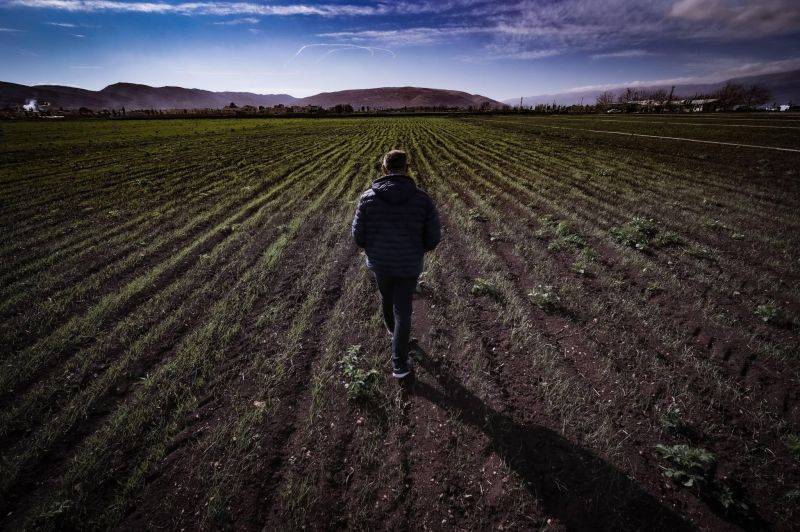
Farmland in Lebanon's Bekaa Valley, an agriculture hub. (Credit: João Sousa/L’Orient Today)
Want to get the Morning Brief by email? Click here to sign up.
Qatari environment and municipality ministries lifted a more-than-year-long ban on imports of mint, parsley, coriander, thyme and mloukhieh from Lebanon. The Qatari Ambassador to Lebanon, Ibrahim bin Abdulaziz Muhammad Salih Al-Sahlawi, conveyed news of the ban’s removal to Lebanese caretaker Agriculture Minister Abbas Hajj Hassan yesterday. Qatar revoked its decision to stop importing Lebanese leafy crops — which it introduced in October 2021, citing high levels of pesticides and E. coli — “after the exporters applied the conditions set by the competent Qatari authorities.” Lebanese agricultural exports lost another market in 2021 after the discovery of Captagon — an illicit stimulant, smuggled in a shipment of pomegranates — forced an embargo from Saudi Arabia. While the effects of the embargoes were largely mitigated by increased exports to other countries, particularly Egypt, a report by the Lebanese Center for Research and Agricultural Studies noted that the situation for Lebanese farmers remains precarious. 2022 customs statistics showed that, despite fruit exports having been halved from the previous year, farmers still export almost three times the amount they used to before the crisis.
"We have agreed on a plan of action, in anticipation of the next government meeting which will be devoted to saving the school year," caretaker Education Minister Abbas Halabi said yesterday after a meeting chaired by caretaker Premier Najib Mikati amid a series of protests by educators. The meeting grouped officials and higher education representatives, including Lebanese University (LU) rector Bassam Badran, and “aimed at clearing the way before the next cabinet session in order to secure the necessary funds," Halabi said. He warned that the spread of the ongoing public teachers’ strike to universities and private schools “would lead to the collapse of the education system.” Public teachers have been on strike since Jan. 10 to demand improved compensation along with revisions to pensions and contracts. Private school teachers on Wednesday held a “warning” strike to make similar demands, repeating public teachers’ call for a government meeting. “I cannot afford to meet the demands of public school teachers without doing the same for their colleagues at Lebanese University," Mikati said on Tuesday, announcing that a cabinet meeting would be held by early next week. The last two cabinet meetings stirred controversy over the right of a caretaker government to convene during a presidential vacancy.
United Nations Human Rights Council Special Procedures experts urged “Lebanese authorities to give much-needed new impetus” to the investigation into the murder of Lebanese intellectual Lokman Slim, two years after his killing. The UN special rapporteurs on extrajudicial executions found “little prospect that current investigations will be successfully completed within a reasonable timeframe.” A secular activist from a Shiite family, 58-year-old Slim was found dead in his car on Feb. 4, 2021, a day after his family reported him missing. “National authorities have shown no indication that the ongoing investigations are in line with relevant international standards,” the UN experts continued, expressing readiness to support Lebanese authorities achieve compliance and urging the international community to provide support and assistance as appropriate.”
Part of a Palestinian family’s house in the Ain al-Hilweh refugee camp, near Saida, collapsed Wednesday night — one of the numerous instances of collapses reported all over the country due to heavy winter storms. No one was injured in the incident, while photos from our correspondent in the area show debris and concrete blocks that had fallen onto beds in the family's bedroom. The family had reportedly repeatedly asked the UN Palestinian Refugee Agency (UNRWA) to renovate their home. UNRWA in January appealed for funding to overcome chronic budget deficits for the entire scope of its operations, after requesting urgent funding for its work in Lebanon last October. Last November, a parliamentary subcommittee was formed to track buildings at risk of collapse after a series of deadly incidents, including the death of a 16-year-old girl following the collapse of her public school’s ceiling. Lebanese Real Estate Authority President Indira al-Zuhairi claimed that over 15,000 buildings across Lebanon “are on the verge of collapse” due to a lack of maintenance or construction with “corrupted materials” in the absence of government supervision.
In case you missed it, here’s our must-read piece from yesterday: “Ammiq wetland: An oasis of life in the Bekaa Valley”
Compiled by Abbas Mahfouz